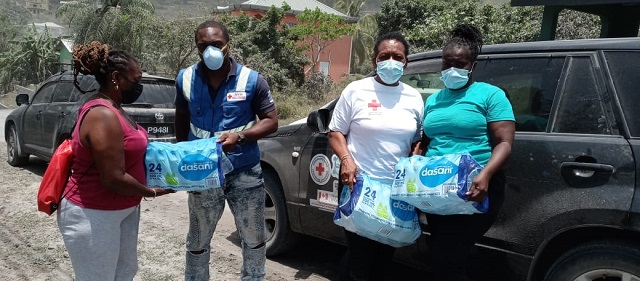Volcano Erupts in St. Vincent and the Grenadines
Red Cross Canada | April 16, 2021
 Following months of heightened activity, the La Soufrière volcano on the Caribbean island of St. Vincent erupted producing a column of ash roughly 10 kilometres high and forcing the evacuation of more than 7,000 people. Government reports indicate that 16,000 people may need to be evacuated from the areas closest to the volcano. The eruption occurs at a time when people in the region are already dealing with a surge in COVID-19 cases as well as a dengue outbreak, resulting in increased risks for the further spread of these diseases.
Following months of heightened activity, the La Soufrière volcano on the Caribbean island of St. Vincent erupted producing a column of ash roughly 10 kilometres high and forcing the evacuation of more than 7,000 people. Government reports indicate that 16,000 people may need to be evacuated from the areas closest to the volcano. The eruption occurs at a time when people in the region are already dealing with a surge in COVID-19 cases as well as a dengue outbreak, resulting in increased risks for the further spread of these diseases.The initial eruption has been followed by several more explosive events which are predicted to continue over the coming days and possibly weeks. According to the National Emergency Management Organization (NEMO), the areas closest to the volcano may be affected by fast-moving lava, volcanic ash, hot gases, and dangerous pyroclastic flows containing very hot solidified lava pieces. There are also reports of water disruptions due to a layer of ash covering much of the country caused by the continuing eruptions. Volcanic ash has even been reported in neighbouring countries such as Barbados. In St. Lucia and Dominica, where authorities are also preparing to support people evacuated from St. Vincent and the Grenadines.
While the Red Cross had been preparing communities in advance of the eruption, people have now had to flee their homes and need assistance. Mothers, children, and people with disabilities or chronic health conditions are most in need. The Red Cross is working to register displaced people at evacuation shelters and distributing hygiene kits, blankets, mattresses and water to people affected by the volcano. As evacuations can be chaotic, the Red Cross is also providing support to separated families to ensure they can be reconnected with their loved ones. As the volcano continues to erupt, the Red Cross will continue to meet the emerging needs of people impacted.
Donate to the International Disaster Relief Fund
Regions
NationalAlberta
British Columbia
Manitoba
New Brunswick
Newfoundland and Labrador
Northwest Territories
Nova Scotia
Ontario
Prince Edward Island
Quebec
Saskatchewan
Nunavut
Yukon
Worldwide
Africa
Americas
Asia
Middle East and North Africa
Europe
Topics
Community HealthEmergencies and Disasters in Canada
Emergencies and Disasters Worldwide
Finding Family
First Aid and CPR
International Humanitarian Law
Migrant and Refugee Services
Our Impact on the Ground
Philanthropy News
Violence, Bullying and Abuse Prevention
Volunteer
Water Safety
Youth
Indigenous Communities
Maternal Newborn and Child Health
Refugee Crisis
Refugee Arrival
